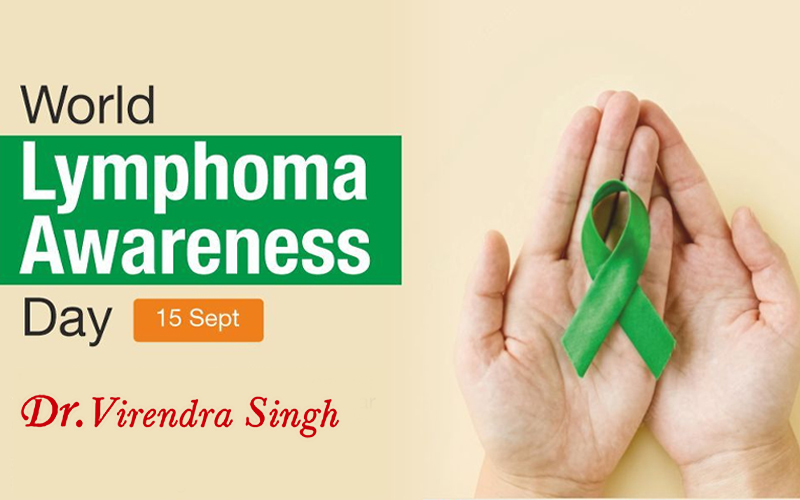
Every year on September 15th, the world unites to recognize World Lymphoma Awareness Day. The international battle against lymphoma, a form of blood cancer that affects millions of people worldwide, is brought to light on this day. The day will have particular relevance in 2024 as we advance cancer research, activism, and patient support. It will break stigmas, promote early detection, and raise awareness. One vital component of the body is the lymphatic system. The lymph nodes, spleen, thymus gland, bone marrow, and other bodily organs are all part of the body’s network for combating germs. Lymphoma is the term for cancer of the lymphatic system. Lymphoma occurs in the cells called Lymphocytes. White blood cells known as lymphocytes are vital to the body’s immune system and aid in the body’s defense against illness.
On World Lymphoma Awareness Day, Dr. Virendra Singh emphasizes the importance of early detection and awareness in the fight against Lymphoma. His vast experience allows him to emphasize how early diagnosis and improved treatment results might result from recognizing the symptoms, which include chronic fatigue, enlarged lymph nodes, unexplained weight loss, and night sweats.
He advocates for regular check-ups, spreading awareness about this type of cancer, and supporting those affected by it. In his opinion, raising awareness and educating people can greatly raise the likelihood of survival and provide patients and their families the confidence to pursue early medical care.
What is Lymphoma?
A particular kind of cancer called lymphoma starts in the lymphatic system, which is a component of the immune system. It affects a specific type of white blood cell called lymphocytes. Two primary forms of lymphoma exist. Both non-Hodgkin lymphoma and Hodgkin lymphoma have symptoms and therapies. Symptoms of Lymphoma often mimic common illnesses, such as fever, fatigue, weight loss, swollen lymph nodes, and night sweats, making early diagnosis a challenge. However, the probability of remission and long-term survival has improved for many individuals due to breakthroughs in medical technology and therapy.
- Hodgkin Lymphoma: The lymph system, which is a component of the immune system, is where this cancer begins, and it causes the affected lymph nodes to enlarge. This cancer may spread to the liver, spleen, bone marrow, or lungs.
- Non-Hodgkin Lymphoma: All lymphomas, with the exception of Hodgkin lymphoma, are grouped under this term.
The Theme for World Lymphoma Awareness Day 2024
The Theme for World Lymphoma Awareness Day 2024 is “It’s time for some honest talk about how we’re feeling”. The emotional implications of having lymphoma are the main emphasis of this theme.
History of World Lymphoma Awareness
Every year on September 15, the world observes World Lymphoma Awareness Day, a campaign to increase public awareness of lymphomas, a broad category of blood malignancies that impact the lymphatic system. The Lymphoma Coalition, a global network of organizations that advocate for lymphoma patients, launched the day in 2004 with the goal of educating the public about the disease’s many subtypes, symptoms, available treatments, and the value of early detection. WorldLymphoma Awareness Day was established and has since expanded dramatically, bringing attention to the disease, supporting patients and their families, encouraging further research, and eventually improving the prognosis for those impacted by this difficult and sometimes misdiagnosed malignancy.
Symptoms of Lymphoma
Following are the symptoms of Lymphoma:
- Fatigue.
- Night Sweats.
- Cough and shortness of breath.
- Itching.
- Loss of weight.
- Enlarged, typically painless lymph nodes in the groin, neck, and armpits.
Risk Factors of Lymphoma
It is unknown what specifically causes lymphoma. However, the likelihood of getting lymphoma is linked to an array of risk factors. These risk factors include:
- Old age.
- Family background of lymphoma.
- Exposure to benzene and other substances.
- Previous cancer treatment for Lymphoma.
- Radiation therapy exposure for cancer.
- Weakened immune system due to organ transplant or HIV infection.
- Weakened immunity brought on by an immune system condition such as lupus, celiac disease, or rheumatoid arthritis.
- Having infections like Epstein-Barr, Hepatitis C, or human T-cell Leukemia/Lymphoma (HTLV-1)
Diagnosis of Lymphoma
- Blood tests.
- Physical examination.
- Molecular test.
- Bone marrow aspiration or biopsy.
- Imaging tests (like PET scans, X-rays, MRI scans).
Treatment for Lymphoma
The optimal course of therapy for you will be determined by your doctor based on the kind and stage of your cancer. The range of available treatment options for lymphoma comprises:
- Radiation therapy.
- Chemotherapy.
- Targeted therapy.
- Immunotherapy.
- Stem cell transplantation (Autologous transplantation of allogeneic transplantation).
Diet During Lymphoma Treatment
Patients with lymphoma should follow the same dietary guidelines as healthy individuals. Diet cannot cure lymphoma. However, It can aid in symptom relief, managing adverse effects of treatment, and promoting healing.
What to Eat During and After Lymphoma Treatment
- Antioxidants: Since antioxidants fight free radicals and aid in the prevention of cancer, they are vital and should be a part of every diet. Examples of antioxidants that can be taken in the daily diet include spinach, carrot, sweet potatoes, Broccoli, Avocado, oranges, bell peppers, lemons, strawberries, tomatoes, and sunflower seeds.
- Cruciferous Vegetables: Among the cruciferous vegetables that can be a regular part of a diet are cauliflower, broccoli, collards, kale, and cabbage.
- Lean Proteins: Lean beef, beans, peas, lentils, Greek yogurt, low-fat cottage cheese, and lean beef are a few foods that are excellent sources of lean proteins.
- Whole grains: You can include whole wheat, quinoa, brown rice, pasta, and oats in your daily diet.
- Fluids: Water is the most important fluid and is a basic necessity. Staying hydrated is crucial to fending off treatment-related side effects such as nausea, vomiting, diarrhea, and constipation. Sugary drinks and alcohol must be avoided during cancer treatment.
FAQs
What is Lymphoma?
A particular kind of cancer called lymphoma starts in the lymphatic system, which is a component of the immune system in the body. It has to do with the unchecked proliferation of lymphocytes, which are white blood cells. There are two main types: Hodgkin Lymphoma (HL) and non-Hodgkin Lymphoma (NHL), each with different subtypes and treatment approaches.
What is the theme for World Lymphoma Awareness Day 2024?
The Theme for World Lymphoma Awareness Day 2024 is “It’s time for some honest talk about how we’re feeling”.
How can I support World Lymphoma Awareness Day?
You can help raise awareness on World Lymphoma Awareness Day by learning about lymphoma and educating people about it, taking part in awareness campaigns, making donations to organizations that support lymphoma research, and posting information on social media. Support groups and fundraising activities also play a crucial role in advancing research and providing assistance to patients.
Are there any risk factors for developing Lymphoma?
Although the precise etiology of lymphoma is not fully understood, a number of risk factors may make the condition more likely to manifest. These include immune system deficiencies, autoimmune conditions, specific infections (such as Epstein-Barr virus), and a history of lymphoma in the family. However, many people with these risk factors never develop Lymphoma.
What is the prognosis for lymphoma patients?
Patients with lymphoma have varying prognoses depending on the kind and stage of the disease as well as how well they respond to treatment. Many forms of lymphoma now have far higher survival rates due to medical advancements. Early detection and personalized treatment plans contribute to a better prognosis and improved quality of life.
